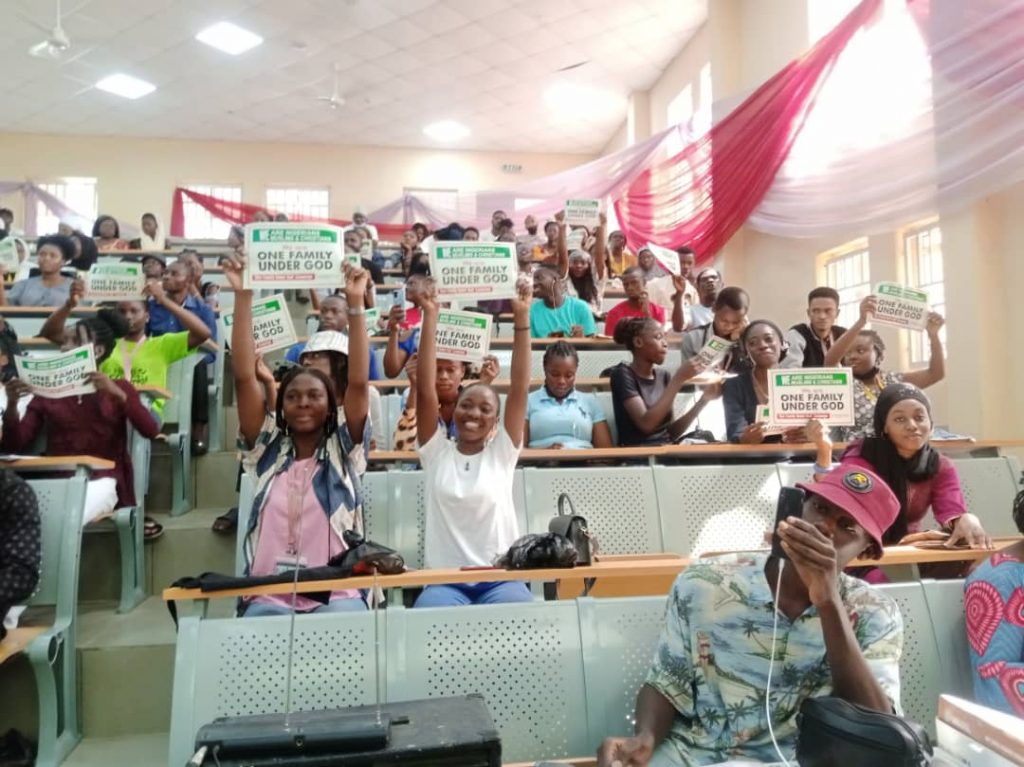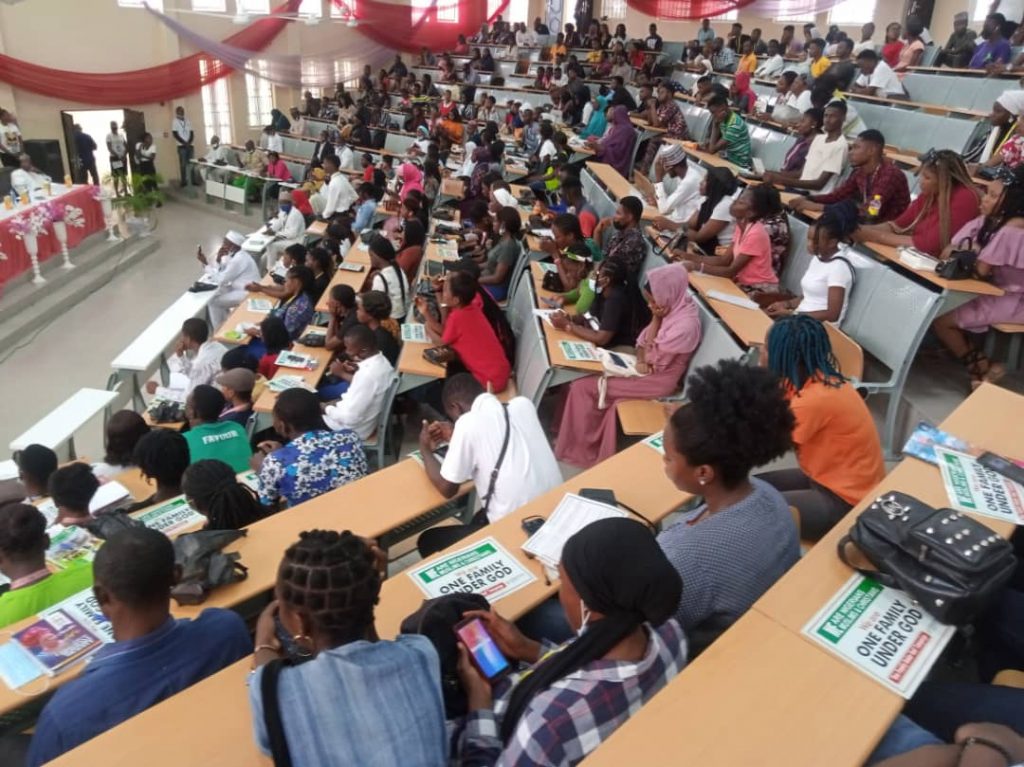Featured
Foundation seeks non-violent approaches to conflict resolution

The Global Peace Foundation (GPF) Nigeria, has called for continuous engagement of community members to embrace dialogue and non-violent approach to resolve potential issues capable of igniting violence.
Its Country Director, Rev. Joseph Hayab, said this at the sidelines of the 2021 Peace and Development summit, organised by the Sultan Maccido Institute for Peace, Leadership and Development Studies, at the University of Abuja on Wednesday.

He noted that for Nigeria to attain sustainable peace and development, it ought to strengthen the capacity of the people in local communities to promote a culture of peace through capacity-building, workshops and sensitisation.
This, he noted, would help in building consensus and bond of friendship towards genuine reconciliation that will ensure unity in diversity, reduce tension and tribal conflicts.
“Nigeria ought to engage diverse community members to embrace dialogue and another nonviolent approach to resolving potential issues capable of igniting violence.
“We must encourage the formation of Community Peace and Reconciliation Committees as community structures at the community level,’’ he said.

According to him, insecurity challenges in Nigeria have been in existence for many decades, resulting in colossal loss of lives and properties, polarising communities, and destroying moral values.
He said the insecurity challenges ravaging the nation were multifaceted, ranging from ethnic, economic, ideological, religious, and political conflicts, depending on the context at hand.
““We” versus “Them” syndrome has been a serious challenge to this nation and could be attributed to being the root cause of most of the problems.
“It is the major driver, giving birth to the trio: banditry and kidnapping in the North-West, insurgency (Boko Haram) in the North East, Indigenous People of Biafra (IPOB), and Militant groups in the South East and South-South respectively.
“ However, most of the conflicts started as economic, social, or political, but ended up with religious connotations, to cap it all, Nigerians will not experience peace until identity-based conflicts are addressed,’’ h added.
Hayab said the youth, often, accused of being in the forefront of committing evils or perpetrating violence in society, have to be actively involved and strengthened to desist from committing mayhem in the society.
According to him, women as major stakeholders in peace building, must be encouraged and supported to play their role in inculcating discipline to their children.
He said this will help in changing the mindset of the youth who are into illicit activities and breeding a new set of a generation that result in achieving a serene environment.
The country director noted the need for political elites to involve youth in decision-making processes and give them the needed support and mentorship for addressing restiveness, militancy, and cultism in Nigeria.
He said relevant civil society organisations and academia ought to intensify efforts and have a platform to share best practices and learning towards mitigating at the community level.
Hayab added that peace building activities should be community-based for taking ownership and sustainability.
“Conflicts and mediation practitioners should adhere to the “Do No Harm” principle in their outreach for effective conflict resolution strategy,’’ he said.
The News Agency of Nigeria (NAN) reports that GPF had launched the One Family Under God Peace building campaign in Nigeria, engaging people of diverse ethno-religious backgrounds in volatile communities.
NAN
Featured
NELFUND: The Renewed Hope Engine Propelling Nigeria’s Youth into Tomorrow

By Dayo Israel, National Youth Leader, APC
As the National Youth Leader of the All Progressives Congress, I have spent most of my tenure fighting for a Nigeria where every young person, regardless of their ward or local government, family income, or circumstance, can chase dreams without the chains of financial despair.
Today, that fight feels like victory, thanks to the Nigerian Education Loan Fund (NELFUND). Launched as a cornerstone of President Bola Ahmed Tinubu’s Renewed Hope Agenda, this initiative isn’t just a policy tweak; it’s a revolution. And under the steady, visionary hand of Managing Director Akintunde Sawyerr, NELFUND has transformed from a bold promise into a roaring engine of opportunity, disbursing over ₦116 billion to more than 396,000 students and shattering barriers for over a million applicants.
Let’s be clear: NELFUND was always destined to be a game-changer. Signed into law by President Tinubu on April 3, 2024, it repealed the outdated 2023 Student Loan Act, replacing it with a modern, inclusive framework that covers tuition, upkeep allowances, and even vocational training—ensuring no Nigerian youth is left on the sidelines of progress.
But what elevates it from groundbreaking to generational? Leadership. Enter Akintunde Sawyerr, the diplomat-turned-executioner whose career reads like a blueprint for results-driven governance. From co-founding the Agricultural Fresh Produce Growers and Exporters Association of Nigeria (AFGEAN) in 2012—backed by icons like former President Olusegun Obasanjo and Dr. Akinwumi Adesina—to steering global logistics at DHL across 21 countries, Sawyerr brings a rare alchemy: strategic foresight fused with unyielding accountability.
As NELFUND’s pioneer MD, he’s turned a fledgling fund into a finely tuned machine, processing over 1 million applications since May 2024 and disbursing ₦116 billion—₦61.33 billion in institutional fees and ₦46.35 billion in upkeep—to students in 231 tertiary institutions nationwide. That’s not bureaucracy; that’s brilliance.
Sawyerr’s touch is everywhere in NELFUND’s ascent. Since the portal’s launch, he’s overseen a digital ecosystem that’s as transparent as it is efficient—seamless verification, BVN-linked tracking, and real-time dashboards that have quashed misinformation and built trust. In just 18 months, the fund has empowered 396,252 students with interest-free loans, many first-generation learners who might otherwise have dropped out.
Sensitization drives in places like Ekiti and Ogun have spiked applications — 12,000 in a single day in one instance, while expansions to vocational centers in Enugu pilot the next wave of skills-based funding. And amid challenges like data mismatches and fee hikes, Sawyerr’s team has iterated relentlessly: aligning disbursements with academic calendars, resuming backlogged upkeep payments for over 3,600 students, and even probing institutional compliance to safeguard every kobo. This isn’t management; it’s mastery—a man who doesn’t just lead but launches futures.
Yet, none of this happens in a vacuum. President Tinubu’s alliance with trailblazers like Sawyerr is the secret sauce securing Nigeria’s tomorrow. The President’s Renewed Hope Agenda isn’t rhetoric; it’s resources—₦100 billion seed capital channeled into a system that prioritizes equity over elitism. Together, they’ve forged a partnership where vision meets velocity: Tinubu’s bold repeal of barriers meets Sawyerr’s boots-on-the-ground execution, turning abstract policy into tangible triumphs. It’s a synergy that’s non-discriminatory by design—Christians, Muslims, every tribe and tongue united in access—fostering national cohesion through classrooms, not courtrooms.
As Sawyerr himself notes, this is “visionary leadership” in action, where the President’s political will ignites reforms that ripple across generations.
Why does this matter to us, Nigeria’s youth? Because NELFUND isn’t handing out handouts—it’s handing out horizons. In a country where 53% of us grapple with unemployment, these loans aren’t just funds; they’re fuel for innovation, entrepreneurship, and endurance.
Picture it: A first-generation polytechnic student in Maiduguri, once sidelined by fees, now graduates debt-free (repayments start two years post-NYSC, employer-deducted for ease) and launches a tech startup. Or a vocational trainee in Enugu, equipped with skills funding, revolutionizing local agriculture. This is quality education that endures—not fleeting certificates, but lifelong launchpads. Sawyerr’s focus on human-centered design ensures loans cover not just books, but bread—upkeep stipends of ₦20,000 monthly keeping hunger at bay so minds can soar. Under his watch, NELFUND has debunked doubts, refuted fraud claims, and delivered results that scream sustainability: Over ₦99.5 billion to 510,000 students by September, with 228 institutions on board.
As youth leaders, we see NELFUND for what it is: A covenant with our future. President Tinubu and MD Sawyerr aren’t just allies; they’re architects of an educated, empowered Nigeria—one where poverty’s grip loosens with every approved application, and innovation blooms from every funded desk. This isn’t charity; it’s an investment in the 70 million of us who will lead tomorrow.
We’ve crossed one million applications not because of luck, but leadership—a duo that’s turning “access denied” into “future unlocked.”
To President Tinubu: Thank you for daring to dream big and backing it with action.
To Akintunde Sawyerr: You’re the executor we needed, proving that one steady hand can steady a nation.
And to every Nigerian youth: Apply. Graduate. Conquer.
Because with NELFUND, your generation isn’t just surviving—it’s thriving, enduring, and eternal.
The Renewed Hope isn’t a slogan; it’s our story, now written in scholarships and success. Let’s keep turning the page.
Dayo Israel is the National Youth Leader of the All Progressives Congress (APC).
-

 Featured6 years ago
Featured6 years agoLampard Names New Chelsea Manager
-

 Featured6 years ago
Featured6 years agoFG To Extends Lockdown In FCT, Lagos Ogun states For 7days
-

 Featured6 years ago
Featured6 years agoChildren Custody: Court Adjourns Mike Ezuruonye, Wife’s Case To April 7
-

 Featured6 years ago
Featured6 years agoNYSC Dismisses Report Of DG’s Plan To Islamize Benue Orientation Camp
-

 Featured4 years ago
Featured4 years agoTransfer Saga: How Mikel Obi Refused to compensate me After I Linked Him Worth $4m Deal In Kuwait SC – Okafor
-
Sports3 years ago
TINUBU LAMBAST DELE MOMODU
-

 News11 months ago
News11 months agoZulu to Super Eagles B team, President Tinubu is happy with you
-
Featured6 years ago
Board urges FG to establish one-stop rehabilitation centres in 6 geopolitical zones
